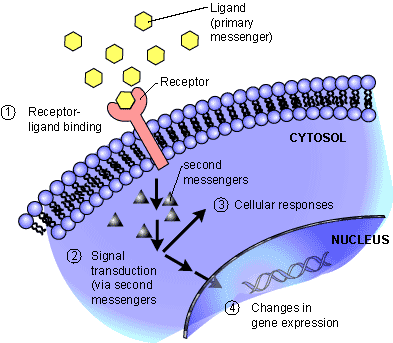Signal Transduction
Signal transduction happens when an extracellular signaling molecule activates a cell surface receptor. In words, this receptor change intracellular molecules modify a response. There are two levels in this procedure: the signaling molecule activates a specific receptor protein on the cell membrane. A 2nd messenger transmits the signal into the cell and eliciting a physiological response. In either level the signal can be amplified. While, one signalling molecule can cause various responses. Gene activations and metabolism alterations are instances of cellular responses to extracellular stimulation which needs signal transduction.

Gene activation leads to additional cellular effects, because the products of responding genes involve instigators of activation; transcription factors produced as a result of a signal transduction cascade can activate even more genes. Whereas, an initial stimulus can switch the expression of a huge number of genes, leading to physiological events such as the increased uptake of glucose from the blood stream and the migration of neutrophils to sites of infection. The group of genes and their activation order to certain stimuli is providing to as a genetic program.